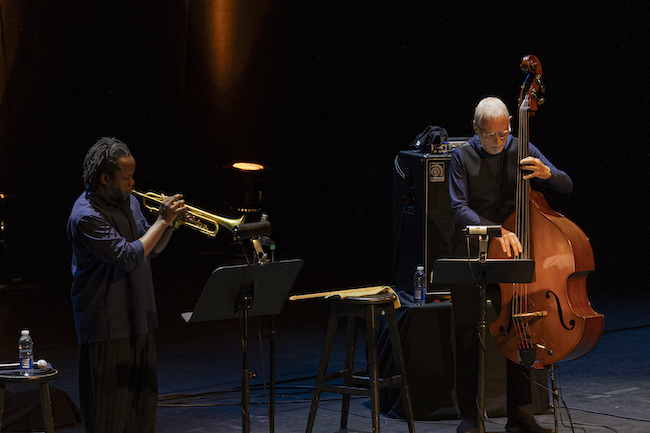Jan 13, 2026 2:09 PM
More Trump-Kennedy Center Cancellations
The fallout from the renaming of the John F. Kennedy Center for the Performing Arts to include President Donald…

A concert of duets featuring trumpeter Ambrose Akinmusire and bassist Dave Holland was cerebral and unhurried at this year’s Montreal Jazz Festival.
(Photo: Frédérique Ménard-Aubin)In its third edition since rebounding from senior management changes and COVID-related disruptions, the 44th Festival International de Jazz de Montreal, held June 27–July 6, didn’t seem to have dropped a beat this summer, drawing massive crowds to both its free plein air shows and paid indoor concerts.
At one free stage, the audiences that greeted headliners like saxophonists Chris Potter, Melissa Aldana and Lakecia Benjamin appeared as engaged and exuberant as those at Bonnaroo or Coachella. That’s been a characteristic of FIJM since I first attended in the early ‘80s — an attribute that distinguishes it from other North American jazz festivals.
Welcomed by torrential applause, Potter’s trio with bassist Matt Brewer and drummer Kendrick Scott responded with a set filled with long improvisational choruses and the type of big sonic gestures more common at pop shows. The evening’s only ballad was delivered late in the set.
If anything, the response to Aldana was even heartier, but her performance struck a much different tone, beginning with three extended, ephemeral pieces that featured floating tempos and dramatic flourishes reminiscent of Wayne Shorter’s later work. Accompanied by pianist Glenn Zalesky, bassist Pablo Menares and drummer Kush Abadey, the Chilean saxophonist seemed to be listening as much as playing, and when she did step forward her lines were expressive, well-considered and succinct. It was 30 minutes before she shifted gears, biting down against a more accelerated tempo.
Benjamin assumed a diametric musical stance, charging through her set as if she had more to express than time allowed. While the palpable energy ignited the crowd, overall the effect was more akin to a run through greatest hits rather than a dramatically nuanced set. A case in point was her tribute to John Coltrane; while her rapid exchanges with drummer E.J. Strickland were fiery, the overall piece lacked coherence.
By contrast, the indoor duets featuring trumpeter Ambrose Akinmusire and bassist Dave Holland seemed cerebral and unhurried. Filled with impressionistic splashes, yet flowing with focus, their performance was highlighted by close listening between the two and some inspired responses from Akinmusire to the bassist’s sight-read contributions. While Holland sounded strong throughout, particularly on a short arco solo, his playing was more reserved than anticipated — an elder master clearly enjoying the role of supporting a distinctive, younger voice.
ECM Records veteran Tord Gustavsen (with bassist Steinar Raknes and drummer Jarle Vespestad) has been touring constantly since the pandemic began to ebb, which was evident from the trio’s multifaceted explorations. Dark-hued and ruminative, the group’s music flowed in long, unbroken streams, a seamless blend of electronic and acoustic colors.
In the same venue — a 425-seat treasure that dates from 1865 — trumpeter Keyon Harrold collaborated with pianist Jason Moran for a diverse journey that included both stentorian bursts and gentle, heartfelt singing from Harrold. Given Harrold’s extremely mixed musical background, this musical partnership might’ve gone in any number of directions, and it stretched across many of the possibilities, with Moran proving to be an ideal fit for this wide-ranging, highly unpredictable adventure.
In the same venue, Moran’s solo set — celebrating the 125th anniversary of Duke Ellington’s birth — was both extraordinarily well conceived and performed. Deep, yet playful, with Moran chatting humorously about the music and its composer at several junctures, the performance was highlighted by an intense delivery of “Black And Tan Fantasy,” the 1927 piece Ellington composed with trumpeter Bubber Miley. Artists as varied as Earl Hines and Louis Sclavis have interpreted the piece, but Moran found a new path through the composition, building a dark rumble into a long, ominous roll of thunder, tinged by some subtle harmony from his right hand.
As FIJM has evolved — and shifted locations from an island in the St. Lawrence River, to a single street in the city’s Latin Quarter, to the large, bespoke Quartiers des Spectacles — it has successfully managed to balance the popular and the avant-garde, free and paid-admission events, and shows that appeal to a range of generations. DB

Belá Fleck during an interview with Fredrika Whitfield on CNN.
Jan 13, 2026 2:09 PM
The fallout from the renaming of the John F. Kennedy Center for the Performing Arts to include President Donald…

Peplowski first came to prominence in legacy swing bands, including the final iteration of the Benny Goodman Orchestra, before beginning a solo career in the late 1980s.
Feb 3, 2026 12:10 AM
Ken Peplowski, a clarinetist and tenor saxophonist who straddled the worlds of traditional and modern jazz, died Feb. 2…

The success of Oregon’s first album, 1971’s Music Of Another Present Era, allowed Towner to establish a solo career.
Jan 19, 2026 5:02 PM
Ralph Towner, a guitarist and composer who blended multiple genres, including jazz — and throughout them all remained…

Rico’s Anti-Microbial Instrument Swab
Jan 19, 2026 2:48 PM
With this year’s NAMM Show right around the corner, we can look forward to plenty of new and innovative instruments…

Richie Beirach was particularly renowned for his approach to chromatic harmony, which he used to improvise reharmonizations of originals and standards.
Jan 27, 2026 11:19 AM
Richie Beirach, a pianist and composer who channeled a knowledge of modern classical music into his jazz practice,…